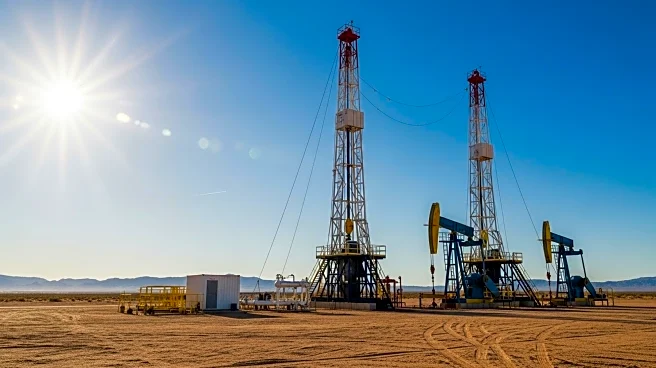What is the story about?
What's Happening?
European oil and gas companies BP and TotalEnergies have announced significant investments in the United States, marking a strategic shift towards increasing their U.S. production capabilities. BP has approved a $5 billion offshore oil field project in the Gulf of Mexico, known as the Tiber-Guadalupe project, which is expected to begin production in 2030. This project will feature a floating platform capable of producing 80,000 barrels of oil equivalent per day, tapping into an estimated 350 million barrels of recoverable resources. Meanwhile, TotalEnergies has acquired a 49% stake in Continental Resources' onshore gas fields in Oklahoma, aiming to produce around 150 million standard cubic feet per day of gas by 2030. These moves align with President Trump's goal to capitalize on the U.S.'s hydrocarbon resources, as BP and TotalEnergies seek to bolster their presence in the U.S. market.
Why It's Important?
The investments by BP and TotalEnergies underscore the growing importance of the U.S. as a key player in the global oil and gas industry. By increasing their production capabilities in the U.S., these companies are positioning themselves to take advantage of the country's abundant hydrocarbon resources. This strategic shift comes at a time when the global energy landscape is evolving, with a focus on balancing renewable energy investments with traditional hydrocarbon production. The increased U.S. exposure for BP and TotalEnergies could lead to greater economic activity and job creation in the regions where these projects are located, while also contributing to the U.S.'s energy independence and security.
What's Next?
BP and TotalEnergies are expected to continue exploring opportunities to expand their U.S. operations, potentially through further acquisitions or partnerships. BP is considering selling minority stakes in its Gulf of Mexico projects, including Tiber and Kaskida, to optimize its investment strategy. As these projects progress, stakeholders such as local governments, environmental groups, and industry players will likely monitor their impact on regional economies and environmental sustainability. The success of these projects could influence future investment decisions by other international energy companies looking to expand their presence in the U.S. market.
Beyond the Headlines
The expansion of BP and TotalEnergies in the U.S. oil and gas sector raises questions about the long-term implications for energy policy and environmental sustainability. As these companies increase their reliance on hydrocarbon production, there may be debates about balancing economic growth with environmental protection. Additionally, the focus on U.S. production could impact global energy markets, potentially affecting prices and supply dynamics. The strategic decisions made by BP and TotalEnergies could serve as a case study for other companies navigating the complexities of the energy transition.















